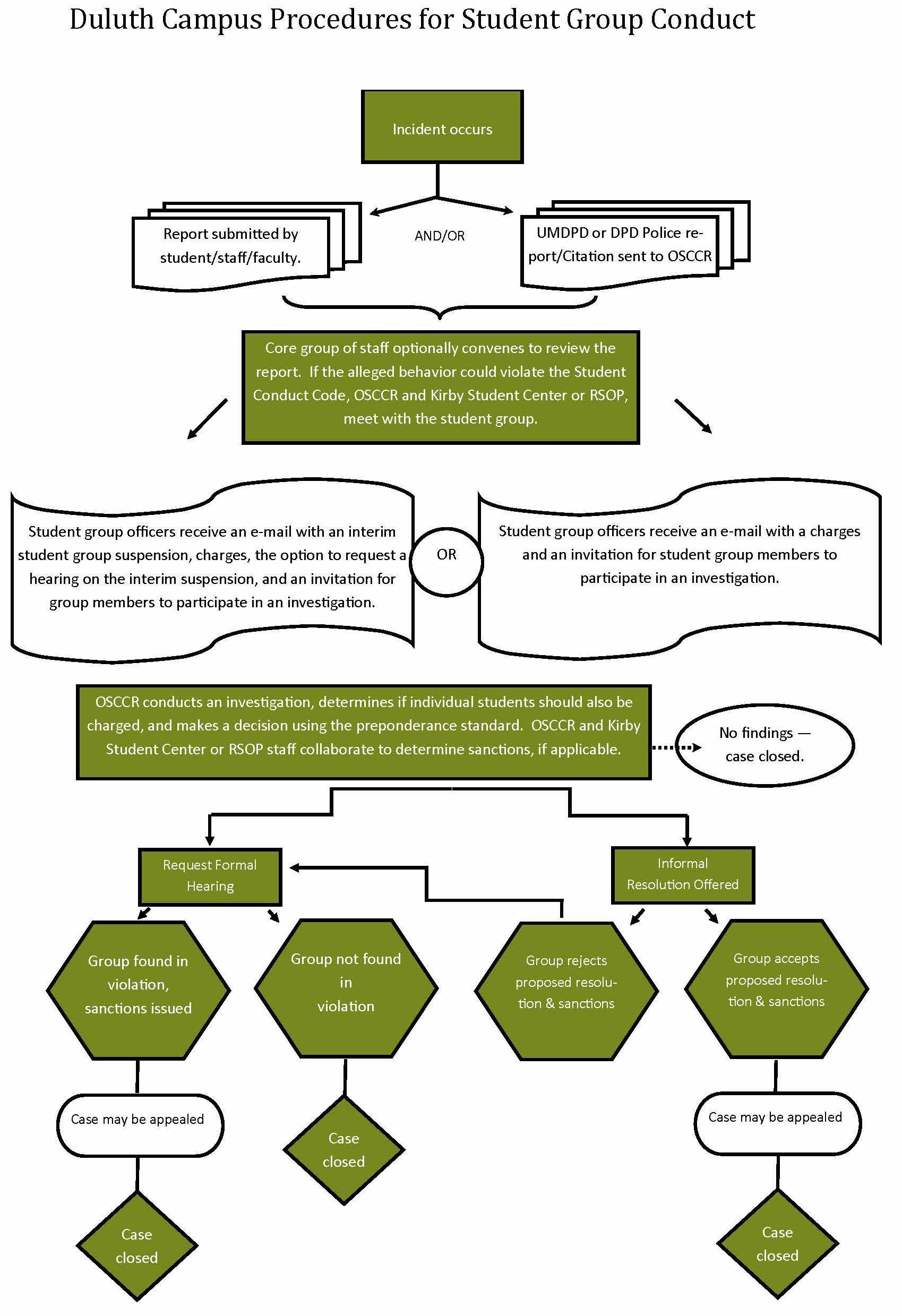The University of Minnesota Duluth has a campus-wide conduct process for student groups, managed by Kirby Student Center, Recreational Sports and Outdoor Programs (RSOP), and the Office of Student Conduct and Conflict Resolution (OSCCR) that handles most complaints under Board of Regents Student Conduct Code.
The Board of Regents Student Conduct Code defines a Student Group as "any group of students that is or has been registered as a University student group under applicable University policies or procedures."
The purpose of the student group conduct process is to provide a framework for resolving complaints about prohibited behavior under the Board of Regents Student Conduct Code, so that:
- Informal resolution is encouraged. The conduct process encourages informal resolution of complaints where appropriate.
- Student development is emphasized. The conduct process emphasizes the educational purpose in student group conduct, including helping students understand and accept responsibility for their own behavior.
- Community interests are met. While the emphasis of the conduct process is on responsible student group self-development, the nature of the offense may require, in fairness to the community, the imposition of educational outcomes.
- Student groups receive fair treatment. Most conduct matters are resolved informally, with the agreement of the student group. When the people involved are unable to reach agreement, however, Board of Regents Policy: Student Conduct Code requires that student groups have the opportunity to receive a fundamentally fair hearing and a campus-wide appeal.
Definitions of Prohibited Behaviors and possible outcomes can be found in the Board of Regents Student Conduct Code, Sections IV and V.
Procedure
- If the incident could be considered prohibited under University policies or rules (see Board of Regents Student Conduct Code Section IV Subd.19, University rules), but does not otherwise pertain to the Student Conduct Code, the following process is used:
- Report form is filed with the office that provides and upholds that particular policy.
- If the incident could pertain to other sections of the Student Conduct Code, the following process is used (see flow chart above):
- Report form is filed with Kirby Student Center, RSOP and/or OSCCR. OSCCR and Kirby Student Center or RSOP staff determine whether to call together a core group meeting to review the report which shall consist of staff members from:
- Kirby Student Center, RSOP, and OSCCR
- Office of Student Life
- Greek Life staff, if applicable
- Faculty or staff from the sponsoring department of the student group, if applicable
- Other University stakeholders as appropriate
- Report form is filed with Kirby Student Center, RSOP and/or OSCCR. OSCCR and Kirby Student Center or RSOP staff determine whether to call together a core group meeting to review the report which shall consist of staff members from:
- Student group officers receive communication to their UMD email with a meeting invitation. After the meeting, charges and an invitation for student group members to participate in an investigation, follow.
- If deemed necessary the Student Group may also receive an Interim Student Group Suspension with the option to request a hearing on the interim suspension.
- An investigation is conducted, and OSCCR determines if individual students should also be charged, and makes a decision using the Preponderance of the Evidence standard. If individual students are charged see procedures under Primary Conduct Procedure. Procedures may proceed in tandem.
- If there are no findings of responsibility no further action is taken and the case is closed.
- If OSCCR determines the Student Group is responsible for prohibited behavior the Student Conduct Code an Informal Resolution will be offered. The Student Group may then:
- Accept informal resolution and request OSCCR take appropriate action.
- Reject informal resolution and invoke their right to a Formal Hearing with the Student Hearing Panel.
- NOTE: A Student Group may take up to five calendar days to accept or reject the informal resolution offered in the administrative meeting. At the expiration of five calendar days, any lack of response will be deemed an acceptance of the resolution.
- If the Student Group accepts the Informal Resolution they are required to complete all outcomes as described. Instructions will be sent via UMD email.
- Once any outcomes associated with the Informal Resolution are complete the case is closed.
- If the Student Group rejects the resolution offered and invokes their right to a Formal Hearing a Student Hearing Panel will be convened.
- The Student Hearing Panel will hear the case and make a determination of responsibility and if appropriate will assign outcomes. These decisions are separate from the Informal Resolution offered and may be the same or may be different, they may be more or less stringent based on the panel’s determination.
- Decisions of the Formal Hearing are communicated to the Student Group via UMD email in a timely manner.
- Once the conditions of the Student Hearing Panel’s decision have been met the case is closed.
- The Student Group has the right to appeal either the Informal Resolution or the Formal Hearing decision based on the following grounds:
- New information became available that was not known at the time of the hearing;
- A major procedural error was made, or;
- The outcome assigned was inconsistent with current outcomes for similar prohibited behavior.
- Appeals must be made in writing within 5 week days of the date of the outcome letter using the Appeal Petition.
- The Student Appeals Panel will convene to review the appeal. The panel may accept, modify, or reject the decision of the hearing body, or return the matter for further proceedings. The decision of the Student Appeals Panel is final.
